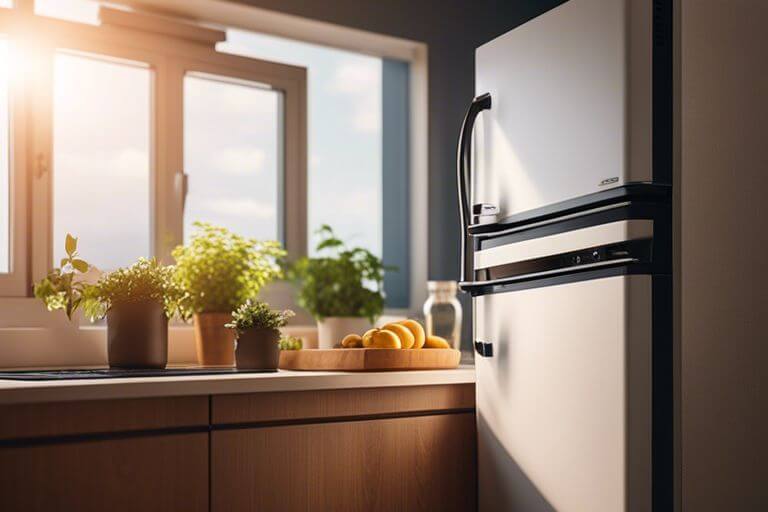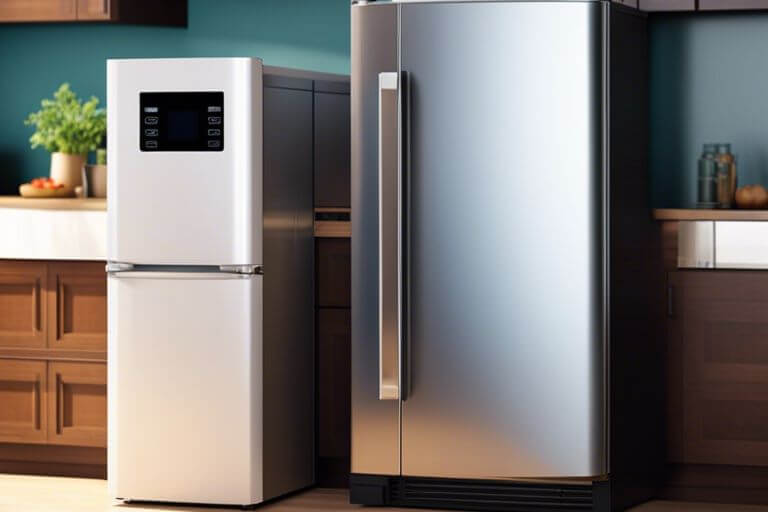Many factors come into play when determining how long your solar generator will power a refrigerator. The size and efficiency of your generator, the power consumption of your refrigerator, and the amount of sunlight it receives all play a crucial role. To accurately calculate the runtime for your specific setup, you can use a wattage calculator such as the one provided by Bluetti Power. Visit their website to learn more about how many watts your solar generator needs to efficiently run your refrigerator.
How Many Watt Solar Generator Do I Need to Run a …
Key Takeaways:
- Battery Capacity: The duration a solar generator can run a refrigerator depends on the battery capacity of the generator. Larger battery capacity will provide more power and longer run times.
- Refrigerator Size: The size and energy efficiency of the refrigerator will also impact how long a solar generator can power it. Larger refrigerators or ones that are energy-intensive may require more power.
- Solar Panel Efficiency: The efficiency of the solar panels connected to the generator will affect how quickly the battery can be recharged and how long it can continue to power the refrigerator.
Solar Generator Basics
What is a solar generator?
The term “solar generator” can sometimes be misleading. It is not a traditional generator that burns fuel to produce electricity. Instead, a solar generator harnesses energy from the sun using photovoltaic panels to generate electricity. It is importantly a portable power station that consists of solar panels, a charge controller, a battery, and an inverter.
How does it work?
A solar generator works by converting sunlight into electricity through the solar panels. The panels capture the sun’s rays and convert them into DC (direct current) electricity. This electricity then flows to the charge controller, which regulates the input of power to the battery to prevent overcharging. The battery stores the electricity produced during the day for later use. The inverter then converts the DC electricity from the battery into AC (alternating current) electricity that can power your devices and appliances.
One key advantage of a solar generator is its ability to provide clean and renewable energy without the need for fuel. This makes it an environmentally friendly option for powering your important devices, especially in off-grid or emergency situations.
Refrigerator Energy Consumption
It is important to understand the energy consumption of your refrigerator to determine how long a solar generator can run it. This information will help you properly size your solar generator for your needs.
Average energy consumption of a refrigerator
Refrigerators are one of the highest energy-consuming appliances in a typical household. On average, a refrigerator can consume anywhere from 100 to 800 watts depending on its size, age, and energy efficiency rating. The energy consumption is typically measured in kilowatt-hours (kWh) per year, and newer energy-efficient models tend to consume less energy.
Factors affecting energy consumption
- The size and capacity of the refrigerator
- The age and condition of the refrigerator
- The temperature settings and frequency of door openings
- The location of the refrigerator in your home
On the other hand, the energy consumption of a refrigerator can also be influenced by factors such as the temperature settings and the frequency at which the doors are opened. By adjusting the thermostat to the recommended temperature and minimizing the number of times you open the refrigerator door, you can reduce its energy consumption.
Affecting energy consumption
- Temperature settings and frequent door openings
By being mindful of these factors affecting the energy consumption of your refrigerator, you can take steps to optimize its efficiency and ultimately prolong the runtime of your solar generator when powering it.
Calculating Run Time
Formula for calculating run time
An important factor to consider when determining how long a solar generator can run a refrigerator is the battery capacity of the generator. The formula for calculating run time is: Run Time = Battery Capacity / Power Consumption of the refrigerator. This formula will give you a rough estimate of how long the solar generator can power your refrigerator before needing to be recharged.
Factors to consider when calculating run time
When calculating the run time of a solar generator for your refrigerator, there are several factors you need to take into consideration. These factors include the efficiency of the solar panels charging the generator, the weather conditions affecting solar power generation, and the energy efficiency of your refrigerator. Additionally, the temperature settings of your refrigerator and how often you open and close its door will also impact the run time of the solar generator.
- Efficiency of the solar panels
- Weather conditions affecting solar power generation
- Energy efficiency of the refrigerator
On top of these factors, you also need to consider the capacity of the solar generator and the power consumption of your refrigerator. A higher capacity generator and a more energy-efficient refrigerator will result in a longer run time. Perceiving these factors will help you make a more accurate estimation of how long your solar generator can power your refrigerator.

Solar Generator Capacity
To find out how long your solar generator can run a refrigerator, you should first understand its capacity. For a detailed guide on the size of the solar generator needed to power a refrigerator, check out What Size Solar Generator Do You Need To Run a Refrigerator.
Measuring solar generator capacity
Capacity refers to the amount of electrical energy that a solar generator can store and deliver. It is usually measured in watt-hours (Wh) or kilowatt-hours (kWh). This specification will help you determine how long your solar generator can power a refrigerator before needing to be recharged.
Choosing the right capacity for your needs
For running a refrigerator, you should consider factors such as the refrigerator’s wattage and how many hours a day you expect to run it. The size of the solar generator you need will depend on these variables, as well as the efficiency of the system and the amount of sunlight it receives.
This calculation is crucial in ensuring that your solar generator can handle the power requirements of your refrigerator and other imperative devices during periods of low sunlight. By choosing the right capacity for your needs, you can optimize the performance and reliability of your solar power setup.
Refrigerator Size and Type
Impact of refrigerator size on run time
Not all refrigerators are created equal, and the size of your refrigerator can have a significant impact on how long a solar generator can power it. Larger refrigerators generally require more power to run compared to smaller ones. If you have a smaller compact refrigerator, you can expect your solar generator to run it for a longer period of time compared to a full-size refrigerator.
Impact of refrigerator type on run time
Not only does the size of your refrigerator matter, but the type of refrigerator you have can also affect how long your solar generator can power it. Refrigerators come in various types such as top freezer, bottom freezer, side-by-side, and French door. Generally, top freezer refrigerators tend to be more energy-efficient and thus require less power to run, making them a better choice if you are looking to maximize the run time of your refrigerator on a solar generator.
Impact of refrigerator type on run time can also be influenced by additional features such as ice makers, water dispensers, and smart technology. These features can increase the energy consumption of the refrigerator, reducing the overall run time on a solar generator. When choosing a refrigerator for use with a solar generator, opt for one with fewer additional features to maximize the efficiency of your setup.

Environmental Factors
Unlike other forms of power generation, the performance of a solar generator is highly dependent on environmental factors. Here are some key aspects to consider when calculating how long a solar generator can run a refrigerator:
Effect of sunlight on solar generator performance
Any obstruction to direct sunlight, such as clouds, trees, or even dust on the solar panels, can significantly reduce the amount of energy generated by the solar generator. It is important to place your solar panels in a location where they can receive maximum sunlight throughout the day. Additionally, the angle at which the solar panels are positioned can also affect their efficiency. Regularly cleaning the panels to ensure they are free of any dirt or debris will help optimize their performance.
Effect of temperature on refrigerator energy consumption
Any rise in temperature can increase the energy consumption of your refrigerator. In hot climates, where the ambient temperature is high, your refrigerator may have to work harder to maintain the set temperature, leading to higher energy usage. Placing your refrigerator in a cool location or ensuring proper ventilation around the appliance can help mitigate this effect.
Effect of temperature on refrigerator energy consumption
| Temperature | Energy Consumption |
|---|---|
| High | Increased |
| Low | Optimized |
Thou, it is imperative to monitor the temperature around your refrigerator and make adjustments as needed to ensure efficient energy usage.
Real-World Examples
Running a small refrigerator with a small solar generator
All it takes is a small solar generator to power a small refrigerator. Let’s say you have a 100-watt solar panel and a 100-watt hour battery. With this setup, you can run a compact refrigerator that consumes around 100-200 watt-hours per day. This means you can keep your important items cool without worrying about power outages or high electricity bills. Just make sure to place your solar panel in a sunny spot to maximize efficiency.
Running a large refrigerator with a large solar generator
With a large solar generator, you can easily power a full-sized refrigerator. For example, if you opt for a 300-watt solar panel system with a 1000-watt hour battery capacity, you can run a standard-sized refrigerator that consumes approximately 500-800 watt-hours per day. This means you can store more food items and keep them fresh without relying solely on the grid. By investing in a larger solar generator, you can enjoy the convenience of a well-stocked fridge even during power outages or off-grid adventures.
When running a large refrigerator with a large solar generator, it’s important to consider the overall energy consumption of your fridge. Modern refrigerators are more energy-efficient, but older models may consume more power. By choosing a high-capacity solar generator that matches your refrigerator’s energy needs, you can ensure a reliable power source for your appliance.

To wrap up
On the whole, it’s crucial to consider the specifications of both the solar generator and the refrigerator to determine how long the generator will run the refrigerator. By knowing the energy consumption of your fridge and the capacity and output of your solar generator, you can calculate approximately how long it will run. It is also crucial to use energy-saving practices, such as keeping the refrigerator door closed as much as possible and ensuring the solar panels are receiving optimal sunlight to maximize the generator’s efficiency.
Keep in mind, solar generators are a great sustainable energy solution, but they have limitations in terms of power output and storage capacity. By understanding these limitations and planning accordingly, you can ensure that your solar generator effectively powers your refrigerator when needed, allowing you to enjoy the benefits of renewable energy while keeping your food fresh and safe.
Q: How long will a solar generator run a refrigerator?
A: The run time of a refrigerator on a solar generator depends on several factors, such as the capacity of the generator, the energy efficiency of the refrigerator, the weather conditions, and the amount of sunlight available. Generally, a solar generator can run a standard refrigerator for about 8-12 hours on a full charge.
Q: What size solar generator is needed to run a refrigerator?
A: To determine the size of the solar generator needed to run a refrigerator, you should consider the power consumption of the refrigerator (in watts), the average daily usage hours, and the energy losses in the system. A medium-sized refrigerator typically requires a solar generator with a capacity of at least 1000-1500 watts.
Q: Can a solar generator run a refrigerator continuously?
A: While a solar generator can power a refrigerator for a certain period, running it continuously may not be feasible unless you have sufficient solar panels to continuously recharge the generator. It’s important to calculate the energy requirements of the refrigerator and the solar generator capacity to ensure continuous operation, or consider a backup power source for extended periods of use.
